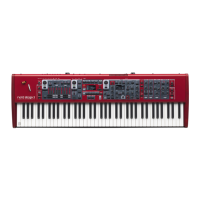8. EXTERN | 41
8
EXTERN SECTION
EXTERN SECTION
Control of external MIDI instruments is an integrated
feature of the Nord Stage 3. By using the Extern sec-
tion, all essential external MIDI control functions are
as accessible and easy to use as the controls for the
Nord Stage 3 sound engines.
The Extern section behaves like the internal instru-
ments in several important ways. It is enabled and
assigned to a keyboard zone in the same way. It has a
multi-purpose VALUE encoder, which is used to send
MIDI Volume, Program Change and Continuous Con-
troller messages. The associated parameter button is
used for selecting the parameter(s) to transmit.
Detailed settings for MIDI Channel, Program Change
and Continuous Controllers, among other things, are
accessed through the Extern Menu (read more about
this on page 55). These settings can be part of the
Programs, which makes it possible for the Nord Stage
3 to send MIDI messages - such as Program Change
- to your external units when programs are changed.
SETTING UP
1 Connect a MIDI cable from the Nord Stage 3 MIDI Out to the
MIDI In on the external device, which could be a rack synth unit, a
computer or most anything else with a MIDI In port.
2 Hold SHIFT and press EXTERN (Program 4 button) to access the
Extern menu.
3 Use the PAGE 3/4buttons to access the “Extern Settings MIDI
Chan” page. This page will say “MIDI Chan Prog” or “MIDI Chan
Glob” depending on how the first Extern menu page setting is set.
4 Use the PROGRAM Dial to select the transmitting MIDI channel
(1-16) which should be used. The Panel A and B buttons are used
for accessing the channel setting for each panel. Press EXIT (Shift)
to leave the menu.
5 Set the external instrument to receive on the MIDI channel defined
in the previous step.
M On the first page of the Extern menu it is possible to select be-
tween Global or per-program MIDI Channel settings. When set to
Global, all programs using the Extern sections will use the same
MIDI channels for Panel A and Panel B respectively. With the Pro-
gram setting (which is the default), each program uses the Extern
MIDI channels defined for and stored with that Program.
USING THE EXTERN SECTION
ACTIVATING
The Extern section is activated in the same way as the Nord Stage 3
sound engines are, by pressing its ON/OFF button.
KEYBOARD ZONES
There are two Extern sections, one for Panel A and one for Panel B.
Keyboard zones can be used for creating splits and layers just like
for the internal sound engines. As an example, if the Extern section is
assigned to only play in zones 1 and 2, the external instrument will only
respond to notes played in these zones.
See the section about Split functionality on page 26 for information
on how to set up and use keyboard zones.
NON-KEYBOARD EXTERN SETUP
In addition to the regular keyboard zones, there is an extra option -
selected the same way as regular keyboard zones - that doesn’t assign
the Extern section to the internal keyboard at all, signified by all KB
ZONE LEDs being off for the Extern section. However, all other External
features are still active, such as the Pitch Stick and the Parameter
knob. This is useful when you want to control external equipment with
no need for MIDI keyboard messages.
OCTAVE SHIFT
Press OCT UP to shift sent MIDI notes up an octave and OCT DOWN (in
conjunction with the SHIFT button) to shift them down. The shift range
depends on the total note range of the external instrument, and the
range of the keyboard zone(s) that the external instrument is currently
assigned to.
PITCH STICK / SUSTAIN PEDAL MESSAGES
Hold SHIFT and press the parameter button to determine whether the
unit should send pitch bend and/or sustain pedal messages via the
Extern MIDI channel, as indicated by the SUSTPED and PSTICK LEDs.

